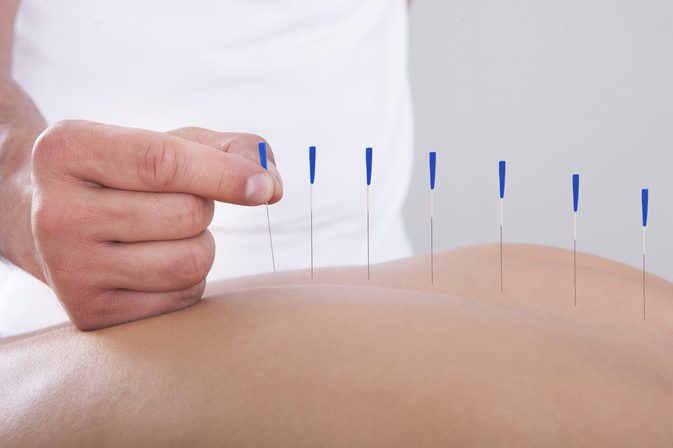Acupuncture
What is Acupuncture?
Acupuncture involves the insertion of extremely thin needles through your skin at strategic points on your body. A key component of traditional Chinese medicine, acupuncture is most commonly used to treat pain.
Traditional Chinese medicine explains acupuncture as a technique for balancing the flow of energy or life force — known as qi or chi (CHEE) — believed to flow through pathways (meridians) in your body. By inserting needles into specific points along these meridians, acupuncture practitioners believe that your energy flow will re-balance.
In contrast, many Western practitioners view the acupuncture points as places to stimulate nerves, muscles and connective tissue. Some believe that this stimulation boosts your body's natural painkillers and increases blood flow.
How does Acupuncture work?
Acupuncture improves the body’s functions and promotes the natural self-healing process by stimulating specific anatomic sites--commonly referred to as acupuncture points, or acupoints. The most common method used to stimulate acupoints is the insertion of fine, sterile needles into the skin. Pressure, heat, or electrical stimulation may further enhance the effects.
Traditional Chinese Medicine is based on an ancient philosophy that describes the universe, and the body, in terms of two opposing forces: yin and yang. When these forces are in balance, the body is healthy. Energy, called "qi" (pronounced "chee") flows along specific pathways, called meridians, throughout the body. This constant flow of energy keeps the yin and yang forces balanced. However, if the flow of energy gets blocked, like water getting stuck behind a dam, the disruption can lead to pain, lack of function, or illness. Acupuncture therapy can release blocked qi in the body and stimulate function, evoking the body’s natural healing response through various physiological systems. Modern research has demonstrated acupuncture’s effects on the nervous system, endocrine and immune systems, cardiovascular system, and digestive system. By stimulating the body’s various systems, acupuncture can help to resolve pain, and improve sleep, digestive function, and sense of well-being.
What happens during an acupuncture treatment?
First, your acupuncturist will ask about your health history. Then, he or she will examine your tongue’s shape, color, and coating, feel your pulse, and possibly perform some additional physical examinations depending on your individual health needs. Using these unique assessment tools, the acupuncturist will be able to recommend a proper treatment plan to address your particular condition. To begin the acupuncture treatment, you lay comfortably on a treatment table while precise acupoints are stimulated on various areas of your body. Most people feel no or minimal discomfort as the fine needles are gently placed. The needles are usually retained between five and 30 minutes. During and after treatments, people report that they feel very relaxed.

How many treatments will I need?
The frequency and number of treatments differ from person to person. Some people experience dramatic relief in the first treatment. For complex or long-standing chronic conditions, one to two treatments per week for several months may be recommended. For acute problems, usually fewer visits are required, usually eight to ten visits in total. An individualized treatment plan that includes the expected number of treatments will be discussed during your initial visit.
What conditions are commonly treated by acupuncture?
The most common ailments presented to an acupuncturist tend to be pain related conditions. For example; arthritis, back, neck, knee and shoulder pain, carpal tunnel syndrome and sciatica.
Traditional Chinese Medicine is a complete medical system that is capable of diagnosing and successfully treating a wide range of conditions including:
Musculoskeletal and Neurological Disorders
- Arthritis
- Neuralgia
- Sciatica
- Back Pain
- Bursitis
- Tendonitis
- Stiff Neck
- Bell's Palsy
- Trigeminal Neuralgia
- Headaches and Migraines
- Stroke
- Cerebral Palsy
- Polio
- Sprains
- Muscle Spasms
- Shingles
Eye, Ear, Nose, Throat Disorders
- Sinusitis
- Sore Throat
- Hay Fever
- Earache
- Nerve Deafness
- Ringing in the Ears
- Dizziness
- Poor Eyesight
Circulatory Disorders
- High Blood Pressure
- Angina Pectoris
- Arteriosclerosis
- Anemia
Gastrointestinal Disorders
- Irritable Bowel Syndrome
- Spastic colon
- Colitis
- Constipation
- Diarrhea
- Food Allergies
- Ulcers
- Gastritis
- Abdominal Bloating
- Hemorrhoids
Gynecological / Genitourinary Disorders
- Premenstrual Syndrome (PMS)
- Irregular, Heavy or Painful Menstruation
- Endometriosis
- Menopause
- Fibroids
- Chronic Bladder Infection
- Complications in Pregnancy
- Morning Sickness
- Kidney Stones
- Impotence
- Infertility in Men and Women
- Sexual Dysfunction
Is acupuncture safe?
In the hands of a well-trained practitioner, acupuncture is a safe and pleasant experience. The most common adverse side-effects are small bruises and light-headedness after treatment.
How much does acupuncture cost?
Acupuncture is covered by some health insurance plans, but not all. If your plan covers acupuncture, our staff will bill your insurance company for the service. If your plan does not cover acupuncture, you may still receive the service for a discounted fee.














